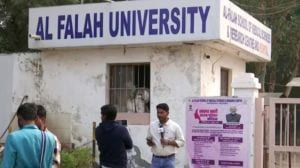Before Sec 377: A film-makers rights and justice for Bhopal
The Delhi High Courts historic decision to decriminalise gay sex equates sexual orientation with gender,caste,and religion....
The Delhi High Courts historic decision to decriminalise gay sex equates sexual orientation with gender,caste,and religion as identities that enjoy Constitutional protection. But while the verdict itself is unprecedented,the two judges who ruled in the case have a distinguished record of expanding Constitutional rights to protect the marginalised. The 105-page judgment,that combines judicial innovation with an inclusive vision,written by Chief Justice A P Shah and Justice S Muralidhar fits perfectly with their record.
Many of Justice Shahs past decisions have been sensitive to the physically and mentally disabled. In 2005,he held that a staff nurse could not be fired by a state-run hospital after being diagnosed with schizophrenia. He also prevented the Railway police from evicting blind hawkers from a platform. In 2008,Chief Justice Shah along with Justice Muralidhar,slammed the Delhi government for not hiring special educators and physicians to cater to dyslexic students in schools run by the Municipal Council of Delhi.
Jitendra Nagpal,a psychiatrist,heads Expressions India an organisation that trains physicians,teachers and educators to deal with mental heath problems of children. He has been following Justice Shahs pronouncements over the years. Justice Shah is sensitive to the fact that ours is an inclusive society,and that people who are different or disabled all have human rights,which must be protected, Nagpal told The Indian Express.
Though he was lauding Justice Shahs approach to mental health,Nagpal could well have been referring to the Section 377 verdict. In 1997,Justice Shah stood firmly to uphold freedom of expression. He held that state broadcaster Doordarshans decision to not telecast Anand Patwardhans award-winning films on violence in Punjab (In Memory of Friends) and on Babri Masjid (Ram ke Naam) violated the directors Constitutional rights. Patwardhan remembers Justice Shah as a judge who came thoroughly prepared to court. He had read every single document we submitted to him so we didnt need to argue much, Patwardhan told The Indian Express. The judge knew the case inside out.
Justice S. Muralidhar has made a mark both from the Bench and in the Bar. As an advocate,he was National Human Rights Commissions lawyer and was appointed amicus curiae (friend of the court) by the Supreme Court in a series of PILs challenging the death penalty. As a lawyer,Justice Muralidhar also worked for the victims of the 1984 Bhopal Gas Tragedy with a tenacity that spanned over 10 years,right up until he was made a judge of the Delhi High Court in 1996.
Satinath Sarangi,an activist who has for long been running a free medical clinic in Bhopal for the gas victims,remembers Justice Muralidhar as extremely devoted and caring. He fought in the Supreme Court for giving the victims the interest on the compensation that they were entitled to said Sarangi. It is because of him that 500,000 victims got 1500 crore rupees from the government.
Sensitivity to those lesser-able or disadvantaged,a belief in the equality and inclusiveness that the Constitution guarantees,and courage these judges had tested their beliefs before. Those beliefs were only waiting for their next articulation. It just so happened that it was in a case that expands the very idea of India.



- 01
- 02
- 03
- 04
- 05




























